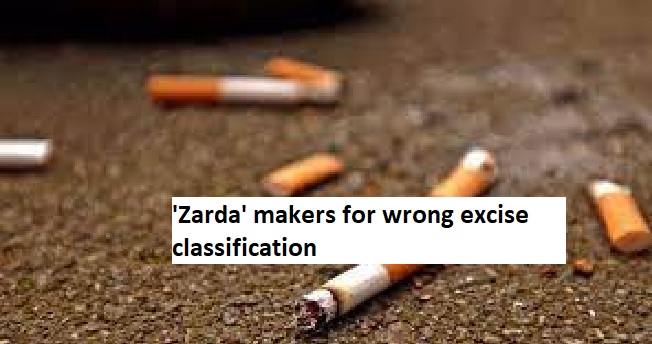


The Supreme Court upheld the penalty and differential duty on the Assessee for wrongly classifying 'Zarda' as 'Chewing Tobacco' to evade higher duty.
Justices S. Ravindra Bhat and Aravind Kumar ruled that the Assessee intentionally misclassified 'Zarda' as 'Chewing Tobacco' to avoid higher excise duty, noting that the product's nature, ingredients, and manufacturing process remained unchanged. Had the Assessee maintained the 'Zarda/jarda scented tobacco' classification, the duty payable under Section 4 of the CE Act would have been significantly higher than under Section 4A with a 50% abatement.
The terms 'chewing tobacco' and 'zarda/jarda scented tobacco' lack specific definitions in the Central Excise Act, 1944 (CE Act) or the Central Excise Tariff Act, 1985 (CETA).
Under Notification No.13 of 2002 dated 01.03.2002 issued under the CE Act, products were subject to excise duty based on their value, regardless of Section 4 of the CE Act. The duty was determined by considering the retail sale price declared for the goods or any applicable abatement when the product was classified as 'chewing tobacco.'
Subsequently, on 24.02.2005, a notification was issued, reclassifying CET SH 2403 9910 as 'chewing tobacco' and CET SH 2403 9930 as 'zarda/jarda scented tobacco,' both of which were subject to a 34% duty at that time.
Later, on 01.03.2006, Notification No.2 of 2006 replaced the 2002 Notification, specifying that goods falling under Section 4A of the CE Act would be assessed based on Maximum Retail Price (MRP). This new 2006 Notification applied to goods under CET SH 2403 9910, 'chewing tobacco,' but excluded those under CET SH 2403 9930, 'zarda/jarda scented tobacco.'
On 11.07.2006, Notification No.16 of 2006 was issued, amending the earlier Notification No.2 of 2006 from 01.03.2006. This amendment brought CET SH 2403 9930, 'zarda/jarda scented tobacco,' within the purview of 'notified goods' under Section 4A of the CE Act.
M/S Urmin Products P. Ltd. ("Assessee") manufactures 'zarda' tobacco. The Revenue claimed that the Assessee falsely categorized its 'zarda/jarda scented tobacco' (CET SH 2403 9930) as 'chewing tobacco' (CET SH 2403 9910) from 01.03.2006 to 10.07.2006 to evade duty under Section 4 of the CE Act, even though the product's nature remained unchanged.
The Revenue, utilizing the extended time limit provided in the proviso to Section 11A(1) of the CE Act, issued a Show Cause Notice to the Assessee. The notice required the Assessee to provide a justification for not assessing its product under Section 4 of the CE Act for the period from 01.03.2006 to 10.07.2006. Subsequently, the Revenue demanded payment of the differential duty from the Assessee and imposed a penalty.
Despite the Factory-in-Charge of the Assessee admitting that their product could be classified as 'jarda/zarda scented tobacco,' they continued to pay duty based on Maximum Retail Price (MRP) assessment as prescribed under Section 4A of the CE Act.
The Order in Original (OIO) affirmed the Show Cause Notice and its associated demand. Subsequently, an appeal was lodged with the CESTAT, where the Assessee argued that the duty should be paid on "flavored chewing tobacco" under CET SH 2403 9910, rather than categorizing it as 'zarda/jarda scented tobacco' under CET SH 2403 9930 of the Central Excise Tariff Act (CETA). The CESTAT ruled in favor of the Assessee, setting aside the penalty and the demand for differential duty.
The Revenue argued that even though the Assessee was not eligible for valuation under Section 4A of the CE Act, they continued to benefit from it until 11.07.2006. Goods categorized as 'chewing tobacco' received a 50% abatement, leading to lower duty payment compared to the transaction value under Section 4 of the CE Act. This was the reason for preferring the value determined under Section 4A of the CE Act, with the 50% abatement, as it resulted in much lower duty payment.
Moreover, 'zarda/jarda scented tobacco' was included in Section 4A of the CE Act through an amendment to Notification No.16 on 11.07.2006. Therefore, during the period from 01.03.2006 to 10.07.2006, the product 'zarda/jarda scented tobacco' was not explicitly designated for assessment under Section 4A of the CE Act.
Due to the intentional misclassification, the Assessee was indeed obligated to pay the differential duty and face penalties.
During the period from 01.03.2006 to 10.07.2006, the Assessee's product should have been classified as 'zarda/jarda scented tobacco' (CET SH 2403 9930), not 'chewing tobacco' (CET SH 2403 9910).
The Bench's perspective was that 'zarda scented tobacco' could not be assessed under the MRP assessment scheme because this classification was not mentioned in Notification No.2 of 2006 dated 01.03.2006, which explicitly specified the goods covered under Section 4A of the CE Act for MRP-based assessment.
The Bench expressed the view that since there was no alteration in the nature, composition, or manufacturing process of the Assessee's product, the change in its classification was a deliberate attempt to avoid paying the higher duty that applied to chewing tobacco.
The observation was made that in a fiscal statute, a specific entry takes precedence over a general one. When there are multiple sub-headings, the one with the most specific description is given preference over the one with a more general description.
TAGS: Deliberate misclassification Classification dispute MRP assessment No change in nature Fiscal statute interpretation Specific entry vs. general entry.